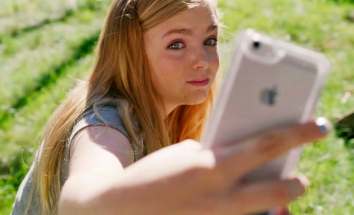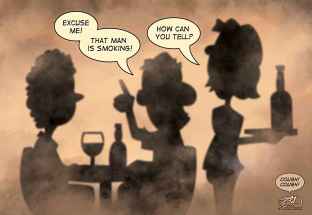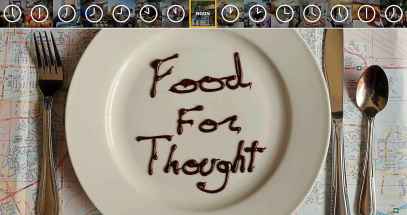Eighth Grade a ‘timeless teen classic’ Three Free Press writers and one expert on being 12 years old discuss Bo Burnham's directorial debut
Read this article for free:
or
Already have an account? Log in here »
To continue reading, please subscribe:
Monthly Digital Subscription
$0 for the first 4 weeks*
- Enjoy unlimited reading on winnipegfreepress.com
- Read the E-Edition, our digital replica newspaper
- Access News Break, our award-winning app
- Play interactive puzzles
*No charge for 4 weeks then price increases to the regular rate of $19.00 plus GST every four weeks. Offer available to new and qualified returning subscribers only. Cancel any time.
Monthly Digital Subscription
$4.75/week*
- Enjoy unlimited reading on winnipegfreepress.com
- Read the E-Edition, our digital replica newspaper
- Access News Break, our award-winning app
- Play interactive puzzles
*Billed as $19 plus GST every four weeks. Cancel any time.
To continue reading, please subscribe:
Add Free Press access to your Brandon Sun subscription for only an additional
$1 for the first 4 weeks*
*Your next subscription payment will increase by $1.00 and you will be charged $16.99 plus GST for four weeks. After four weeks, your payment will increase to $23.99 plus GST every four weeks.
Read unlimited articles for free today:
or
Already have an account? Log in here »
Hey there, time traveller!
This article was published 17/08/2018 (2679 days ago), so information in it may no longer be current.
There’s a scene in Eighth Grade in which our painfully awkward protagonist, Kayla (Elsie Fisher), is lying in bed, scrolling, the blue light from her iPhone illuminating the acne-covered crescent of her chin. It’s the perfect visual shorthand for life as a middle schooler in 2018.
Online, Kayla is the host of plucky YouTube videos about confidence and the importance of being yourself. But in the hallways of school, she’s painfully awkward and self-conscious, and mostly invisible to her peers. Actually being a teenage girl is hard, but so is being the single dad of one, as Kayla’s dad (played by Josh Hamilton) beautifully illustrates.
Director Bo Burnham’s portrayal of junior high life in the era of social media is notable not just for its unflinching realism, but for its ability to feel both incredibly timely and absolutely timeless. It’s also becoming one of the most talked-about movies of the summer, so we thought we’d put it to a panel discussion featuring two former 13-year-old girls, Jen Zoratti and Erin Lebar, current 12-year-old girl Sarah Fontaine-Sinclair, and her dad, Niigaan Sinclair.
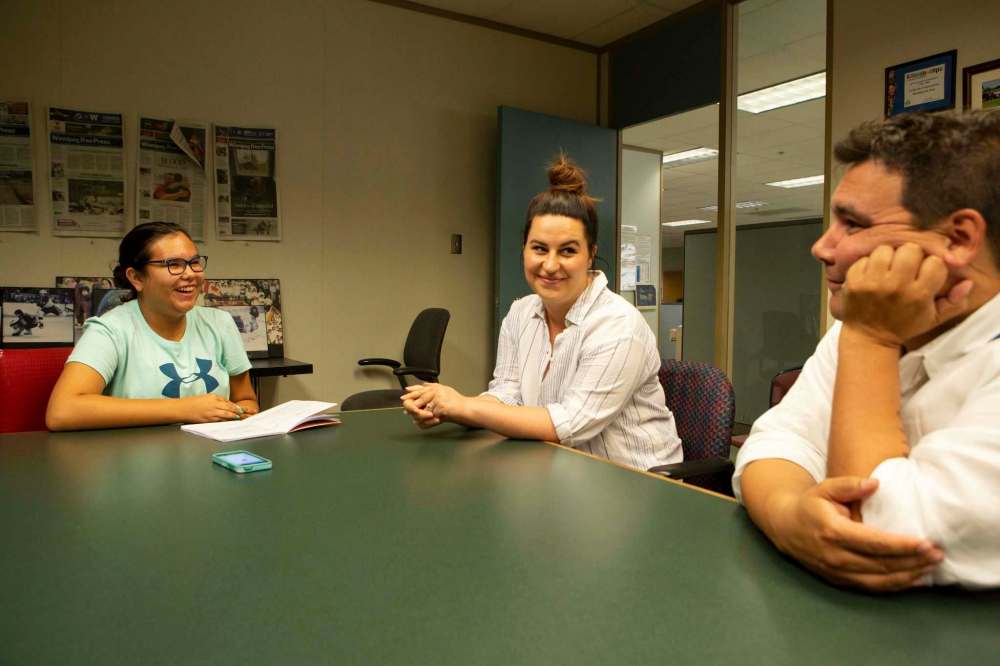
Note: there are some spoilers throughout.
Jen Zoratti: Sarah, you’ve seen the movie twice! And I see you have notes for this discussion.
Sarah Fontaine-Sinclair: I’m prepared.
Jen: First impressions of the movie for you, as someone who is very close to that age group. Was it accurate?
Sarah: At points, it was. Most of it was. But, like, the popular girls? You don’t need to be a mean girl to be popular. You can be nice. You don’t need to be a mean, rich bully.
Jen: So they were kind of stereotypical teen movie bullies.
Sarah: Yeah. But I really liked (the movie). The character Kayla, she was actually really realistic. Usually in teenage movies, the teens are played by older adults with perfect skin and perfect teeth. She actually had real acne on her face.
Erin Lebar: I LOVED that.
Niigaan Sinclair: She was also using filters, which seems like a very accurate thing.
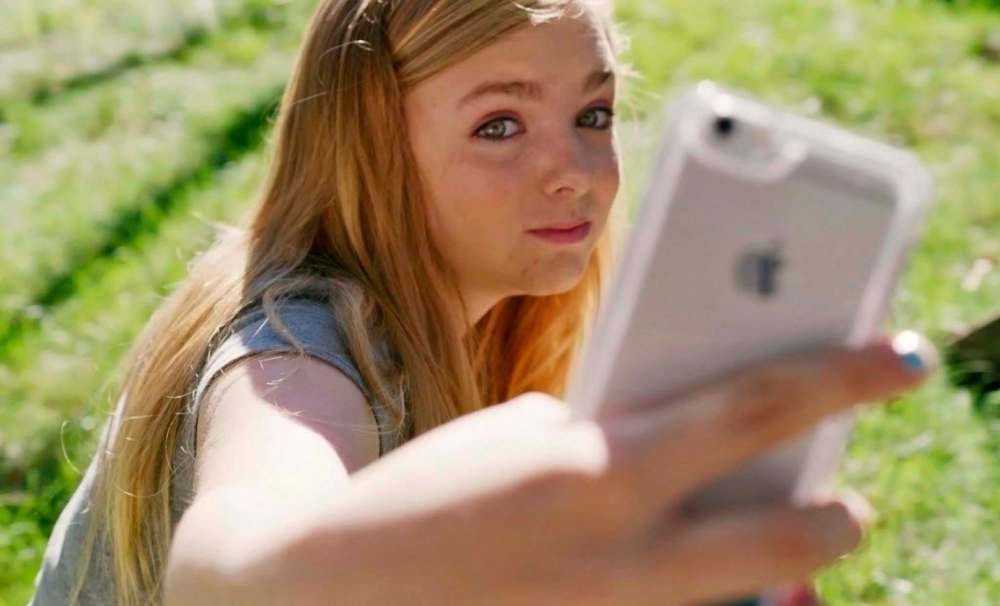
Erin: We didn’t have filters when we were 13. We just had full blown acne photos.
Jen: I also don’t think I had a cellphone until I was 17.
Erin: I was in first-year university.
Jen: Sarah, do you have a phone?
Sarah: Yeah, I have a phone.
Jen: Obviously. That was probably a silly question. What did you think about the use of technology?
Sarah: I definitely use Snapchat, and I use mostly filters and most of my friends use filters. But it’s bad because you need to show yourself and what you really are. I feel like we shouldn’t use filters because we should show our full selves.
Jen: I think adults struggle with that, too — resisting the pressure to present our best, most filtered selves. I heard an interview with the director where he was talking about wanting to use Facebook throughout the film, and Elsie Fisher had to tell him that kids didn’t use it. Like, moms use Facebook.
Niigaan: That’s a line in the film isn’t it?
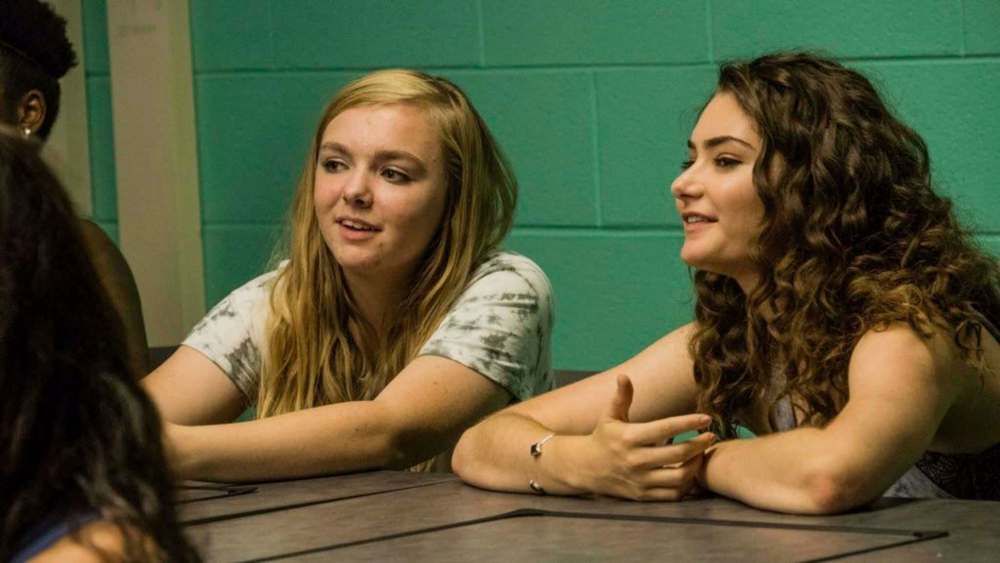
Jen: Yes! I also loved the scenes where she was doing her YouTube videos that have, like, one view. No views. It really captured that whole shouting into the void idea, too, and how her online persona was so different from her offline one.
Sarah: I think those videos were really empowering to this generation, but also to Kayla, the character. She was building confidence in herself, and she was really helping herself.
Erin: What I loved about this movie, even though it highlighted that it’s a new generation, there are also still the same problems we dealt with as 13-year-old girls. Insecurity, scared to talk to boys, don’t know how to make friends — all of those issues are the same, regardless of whether you have a cellphone in your hand or not.
Jen: Like when she’s going to hang out with the older teenagers and she looks in her closet and just says, ‘F—.’ We’ve all been right there. I saw so much of myself. I cringed a lot during this film.
Sarah: So much.
Jen: We need to talk about the back-seat scene. (In one of the movie’s most disturbing scenes, Kayla is in a car with an older boy who has offered to drive her home from the mall. He pulls over and joins her in the back seat, and starts a game of truth or dare. When things go too far, Kayla asserts herself — and he berates her.)
Erin: I just crawled out of my skin.
Niigaan: Obviously, I identify with the father in the film. The worst part of it is, how clearly the father loved Kayla but had no idea how to show it — and she’s going through a phase when she didn’t want to hear it. At the mall, when he follows her. He’s not doing that because he’s an awful person, he’s doing that because he loves her so much. And then, of course, he completely pulls away — which enters the violence. When you pull away, what fills the space? It’s really difficult to have a teenager in your life, but the key is to be present — which is what the fire scene was about. Don’t give up. Not that he gave up there, but he went home — and that’s where the violence happened in the back seat.
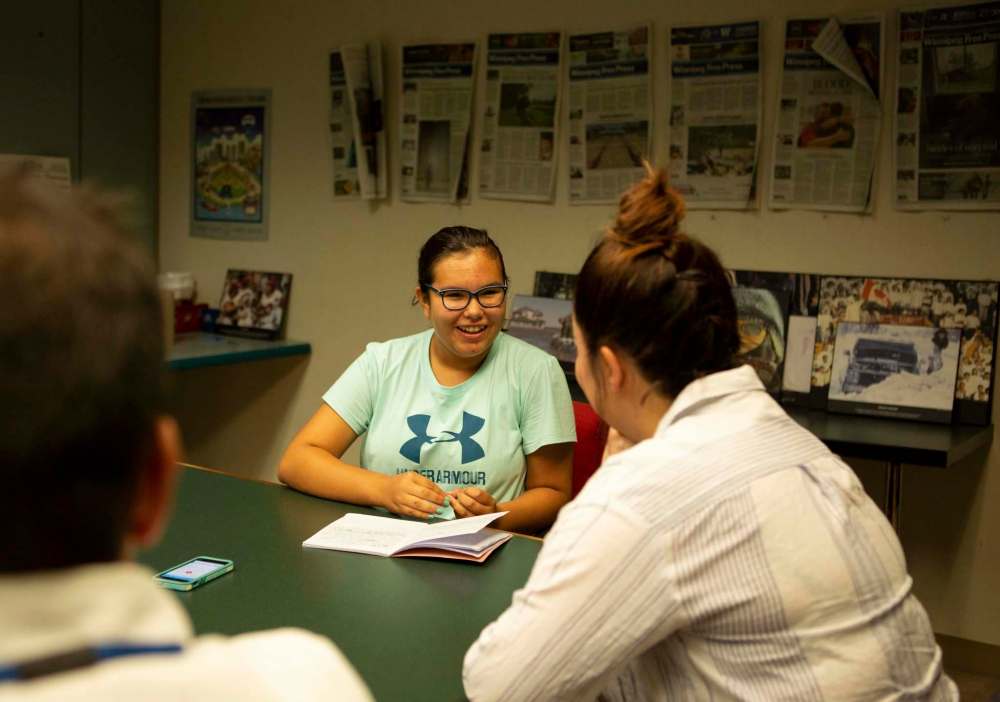
Erin: And then when she was apologizing all the way home. I was like, ‘You don’t have to say sorry!’
Jen: I think it really hit on a survival tactic many women and girls use, which is to defuse the situation by appeasing, acquiescing or apologizing. You could tell that despite her discomfort, she didn’t want to hurt his feelings.
Erin: Even if you’re not taught that explicitly, it’s your instinct.
Sarah: He was making it seem like it was her fault. You don’t need to apologize!
Erin: I’m glad you know that.
Niigaan: When we were heading to the car, I couldn’t say quick enough, ‘Notice how fast that situation got out of control?’ I think, for me, that was the most brutal part of reality. I think many conversations were had with parents and young women after that.
Jen: And I hope with young men, too. That was such a teachable moment on how violence doesn’t always look like outward assault. Manipulation and coercion are also forms of violence. Such a nice antidote to that scene was the scene at the end, when Gabe (Jake Ryan), the equally awkward guy from the pool party invites her over for chicken nuggets.
Erin: That scene made my heart explode. With every kind of sauce all lined up? I was like, ‘Date that one, he’s nice!’
Sarah: I really liked that last scene, at the graduation, when she stood up to the popular girl and said, ‘If you played the card game I gave you, you probably would have figured out it was so good.’ I thought that was really empowering, even in her way, with her timidness. But that was a really big step for her.
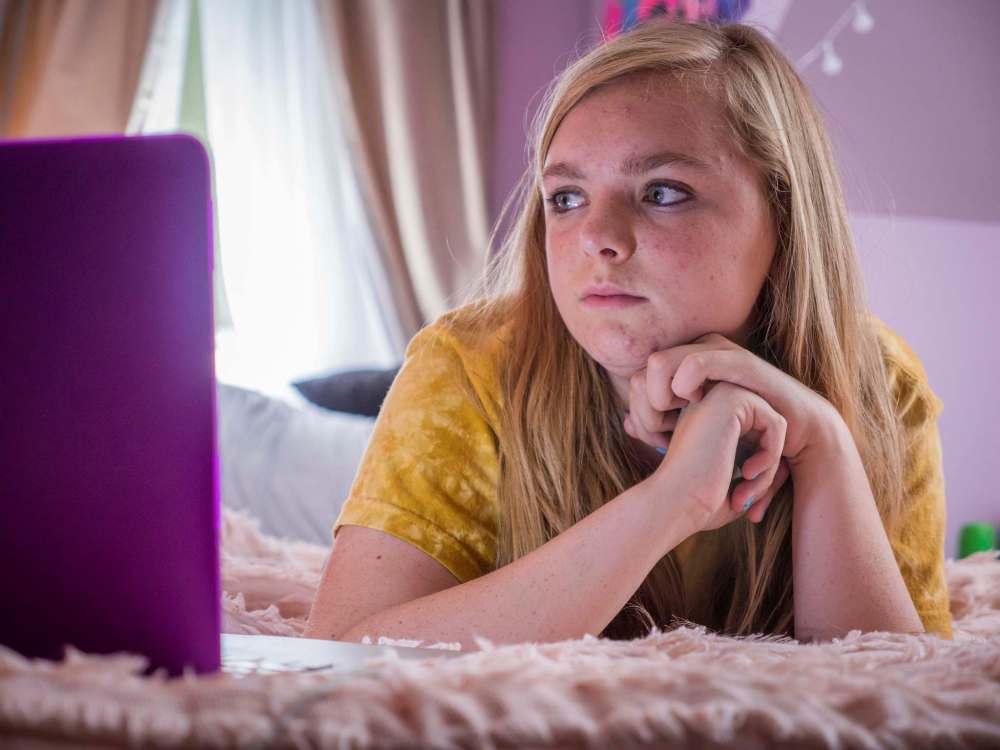
Jen: I also liked the content of that message, because you do miss out on a lot of stuff when you pretend you’re too cool. You miss out on a lot. You miss out on people, you miss out on things, you miss out on experiences. Sarah, did this movie make you nervous to start junior high?
Sarah: I’m really excited for it, but I’m also really nervous because there’s going to be so many new people, and there are probably a lot of groups like at this school and maybe they’ll merge or maybe they’ll conflict. But I love making new friends.
Niigaan: What I realized is how brutally different it is in a social media world, growing up, because you never turn off what was normally an 9-to-5 life. So you go to school, and your whole job is to position yourself so you don’t look out of place or uncool or like a nerd. I remember recently apologizing to one of the girls I went to junior high with, because I was so sorry that I participated in this bullying of her — but I was really doing it, I think, because I was so happy they were focused on her and not on me, because I was the new kid and very nerdy and also brown. I still feel a lot of guilt about that. But when I was a kid, it was like 9 o’clock you got there, and 3:30 you survived. You could go home. Now, you can’t turn off the need for attention and likes. And that’s awful.
Erin: Being a teenager’s hard and I think this movie’s a good example of that. I was explaining to my fiancé how hard it is to be a teenage girl because obviously he’s never been through that, and that’s what it is — there’s constantly voices in your head saying, ‘Don’t talk too much, don’t talk too little, what’s in my teeth? Is my acne terrible today?’ It’s a constant stream of self-critique.
I feel like this movie is going to become a classic teen movie. I went home and watched Pretty in Pink, and I feel like it could it fall into that echelon on timeless teen adolescent classics.

Niigaan Sinclair is Anishinaabe and is a columnist at the Winnipeg Free Press.


Jen Zoratti is a Winnipeg Free Press columnist and author of the newsletter, NEXT, a weekly look towards a post-pandemic future.
Our newsroom depends on a growing audience of readers to power our journalism. If you are not a paid reader, please consider becoming a subscriber.
Our newsroom depends on its audience of readers to power our journalism. Thank you for your support.
History
Updated on Saturday, August 18, 2018 12:44 PM CDT: Typo fixed.








